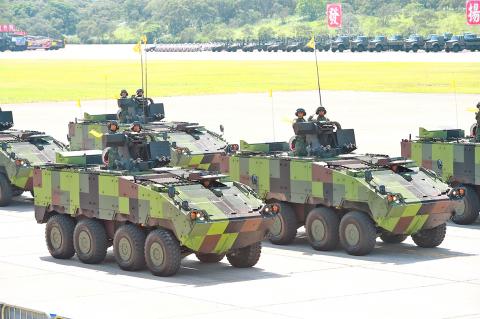Public prosecutors have detained dozens of military officials and civilian defense contractors for questioning as part of a massive operation yesterday investigating military corruption in which contractors allegedly provided cheap, inferior components from China that were used to produce CM-32 “Clouded Leopard” armored vehicles.
The operation involved raids that resulted in about 60 people being detained, along with the seizure of documents and other evidence at 37 locations across the nation, including the Ministry of National Defense’s Procurement Office, the Ordnance Readiness Development Center in Nantou County and the ministry’s Armaments Bureau 209th Arsenal, which has its facilities at the ordinance center.
Military officials and supervisors of the ministry’s procurement program allegedly colluded with unqualified contractors over a NT$7.6 billion (US$243.9 million) tender package in 2012 to provide chassis and power equipment for the CM-32 vehicles, which were developed by the ordinance center, the military’s main production and maintenance facility for tanks and armored personnel carriers.

Photo: Chang Chia-ming, Taipei Times
The scandal has been reported as a breach of national security and unauthorized disclosure of classified military material, as contractors allegedly employed Chinese workers and had Chinese subcontractors producing parts in the project’s supply chain.
Top executives, managers and accountants of contractors were summoned for questioning by prosecutors, including from Chung Hsin Electric and Machinery Manufacturing Corp (CHEM, 中興電工), Yi Rong Technology Co (億嶸科技), Wei Shuan Co (崴軒) and Chi Fu Industry (啟福工業).
CHEM was contracted for the project after a bid NT$4.8 billion, but the company did not manufacture parts and equipment. CHEM subcontracted the manufacturing portion of the project to Yi Rong Technology, Wei Shuan and Chi Fu Industry.
However, prosecutors said the three subcontractors do not have the certification required in the contract.
The contract specified that all manufacturing had to be done domestically by Taiwanese, prohibiting the contractor and its partner companies from employing Chinese workers or workers from other foreign nations, while no materials and parts from China or other foreign countries were to be used, prosecutors said.
Contractors breached the terms of the deal, prosecutors said.
The deals had undermined national security, while there remains suspicion that military officials received kickbacks and other inducements, prosecutors added.
The investigation is focused on whether military officials were “bought off” during the tender procurement process or during the final acceptance and check phase, prosecutors said.
Equipment and parts for the project were delivered in 2012 for assembly and testing at the 209th Arsenal.
The CM-32 vehicles were reported to have numerous problems, including a high rate of defective parts, leading to a judicial probe, which began about a year ago.

Intelligence agents have recorded 510,000 instances of “controversial information” being spread online by the Chinese Communist Party (CCP) so far this year, the National Security Bureau (NSB) said in a report yesterday, as it warned of artificial intelligence (AI) being employed to generate destabilizing misinformation. The bureau submitted a written report to the Legislative Yuan in preparation for National Security Bureau Director-General Tsai Ming-yen’s (蔡明彥) appearance before the Foreign Affairs and National Defense Committee today. The CCP has been using cognitive warfare to divide Taiwanese society by commenting on controversial issues such as Taiwan Semiconductor Manufacturing Co’s (TSMC, 台積電) investments in the

INVESTIGATION: The case is the latest instance of a DPP figure being implicated in an espionage network accused of allegedly leaking information to Chinese intelligence Democratic Progressive Party (DPP) member Ho Jen-chieh (何仁傑) was detained and held incommunicado yesterday on suspicion of spying for China during his tenure as assistant to then-minister of foreign affairs Joseph Wu (吳釗燮). The Taipei District Prosecutors’ Office said Ho was implicated during its investigation into alleged spying activities by former Presidential Office consultant Wu Shang-yu (吳尚雨). Prosecutors said there is reason to believe Ho breached the National Security Act (國家安全法) by leaking classified Ministry of Foreign Affairs information to Chinese intelligence. Following interrogation, prosecutors petitioned the Taipei District Court to detain Ho, citing concerns over potential collusion or tampering of evidence. The

‘COMPREHENSIVE PLAN’: Lin Chia-lung said that the government was ready to talk about a variety of issues, including investment in and purchases from the US The National Stabilization Fund (NSF) yesterday announced that it would step in to staunch stock market losses for the ninth time in the nation’s history. An NSF board meeting, originally scheduled for Monday next week, was moved to yesterday after stocks plummeted in the wake of US President Donald Trump’s announcement of 32 percent tariffs on Taiwan on Wednesday last week. Board members voted to support the stock market with the NT$500 billion (US$15.15 billion) fund, with injections of funds to begin as soon as today. The NSF in 2000 injected NT$120 billion to stabilize stocks, the most ever. The lowest amount it

NEGOTIATIONS: Taiwan has good relations with Washington and the outlook for the negotiations looks promising, Minister of Economic Affairs J.W. Kuo said Taiwan’s GDP growth this year is expected to decrease by 0.43 to 1.61 percentage points due to the effects of US tariffs, National Development Council (NDC) Minister Paul Liu (劉鏡清) said at a meeting of the legislature’s Economics Committee in Taipei yesterday, citing a preliminary estimate by a private research institution. Taiwan’s economy would be significantly affected by the 32 percent “reciprocal” tariffs slapped by the US, which took effect yesterday, Liu said, adding that GDP growth could fall below 3 percent and potentially even dip below 2 percent to 1.53 percent this year. The council has commissioned another institution